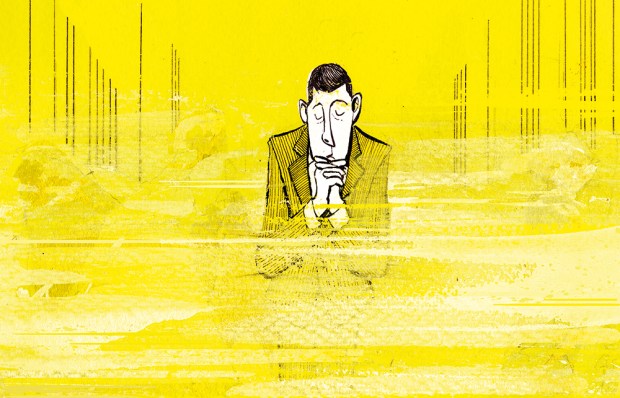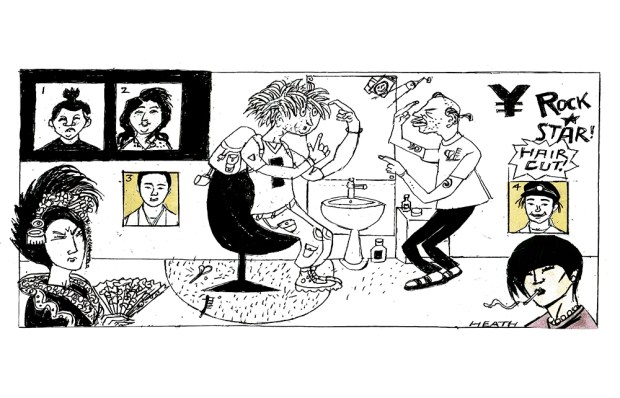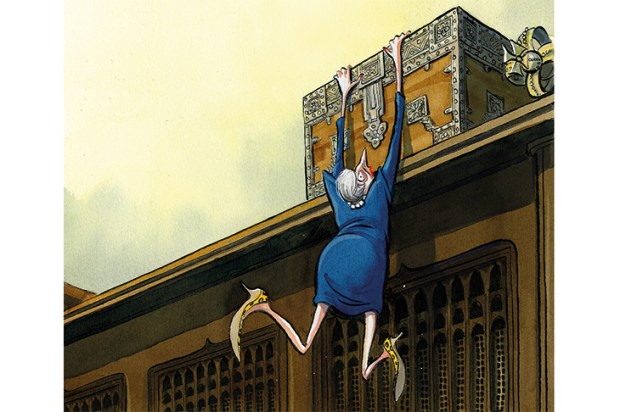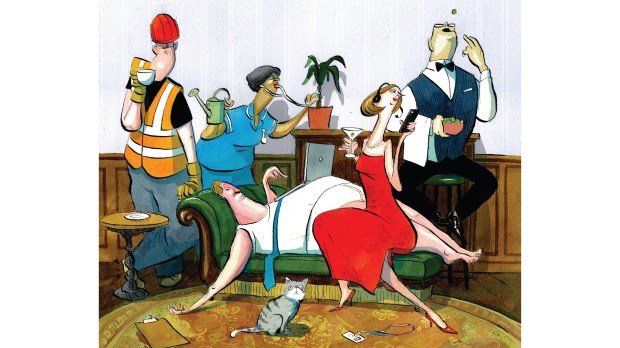Over the past 20 years, the old British trait of self-deprecation has been killed off. And in its place, boasting is booming.
Last week, I was told by an 80-year-old Scottish businessman what a successful shipping tycoon he is, how wonderful his poems are, and why young women find him so attractive. Over a three-hour dinner, he never drew breath, never asked a question and only ever talked about his brilliant self.
Tycoon types have always shown off, but now the habit has migrated down the generations and from men — the traditional show-offs — to women. I can no longer face seeing one old friend in her thirties, because every time I see her she says: ‘You know what? I’m bloody good at my job.’
At the younger end of the spectrum, the boasting has been boosted by the mollycoddling effects of an over-indulgent education system. Last week, the University of Sheffield revealed that undergraduates are allowed to avoid exam questions that include distressing topics like racism, sexuality and gender.
I gave up teaching at a university a few years ago when I was told not to correct spelling mistakes or give low marks in exams. ‘You seem to think that if a student does badly it’s their fault,’ I was told by my rampantly progressive boss. On another occasion, she took against me teaching dates and facts to the undergraduates: ‘You must understand. We’re not here to teach them what to think, but how to think.’ I handed in my notice shortly after.
If you’re never told off at school or university, and never get a bad mark, no wonder you enter your twenties thinking you’re the Messiah. And if you haven’t been taught anything about the outside world or anything that offends your world view, no wonder you have nothing to talk about apart from the ever-fascinating subject of yourself.
Then there’s the ego-intensifying effect of the internet and social media — or show-off media, to give it its proper name. Yes, there’s all the trolling and the abuse to take you down a peg or two. But then there’s much more mutual praise cascading across the world wide web, as everyone love-bombs each other with likes and heart symbols. That article you wrote about Paris Hilton’s chihuahuas? Well, if all your Facebook friends say it’s worthy of a Pulitzer prize, who are you to disagree?
The internet acts as one great echo chamber for the ego. You could, in theory, use the web to learn Serbo-Croat, read Proust and extend your mind’s gaze beyond your navel. But most of us use the internet to read about the few things we’re already interested in, or to send and receive messages about ourselves: where we’ve been on holiday; why our views on Brexit, Trump and the hilarious antics of our cat are so gripping.
In the old days, when you had to read a newspaper to learn the news, people would at least flick through the foreign pages and the book reviews on their way to the easier bits. Now you can avoid altogether the tricky articles that have nothing to do with your own cloistered existence. As curiosity about the outside world shrinks, the brain turns inward and focuses on our favourite subject — ourselves. As Francis Bacon said: ‘It is a poor centre of a man’s actions, Himself.’
Throw in the torrent of show-off TV shows (The X Factor, Britain’s Got Talent, Dragon’s Den) and show-off advertising slogans such as L’Oréal’s ‘Because You’re Worth It’ (are you really?). Then add in the decline of religion, with its outdated emphasis on a higher power. It’s no surprise that the ego has completely triumphed.
The rise of an America-style meritocracy, too, has swelled the national desire to show off. Once the elite feel they’ve deserved their superior position, they also feel they’ve earned the right to show off.
Noblesse oblige was always a suspect notion. The upper classes were never kinder than other classes, but they did develop a self-deprecating language to take the edge off their inherited advantages: ‘I’m so awfully sorry but…’; ‘You couldn’t possibly pass the salt…’; ‘I’m utterly hopeless at backgammon/exams/my job.’
That self-deprecation was often an exercise in the pride that apes humility. But still, it was a lot better than the pride that apes even greater pride. Better to say ‘Sorry’ on smashing a winning volley at tennis than to fist-pump. Better to say you’re useless and ask people questions than take up the new modern dinner party convention: banging on about how exceptional you are.
The show-off epidemic all comes down, paradoxically, to the rising tide of national insecurity. In a world where everyone is showing off about how tremendous their holiday was, how clever their latest book is and how funny their cat is, you’re bound to feel one down — even while you’re frantically showing off online, too.
Insecurity leads to showing off because you desperately think that saying you’re brilliant at something might persuade someone to think you really are brilliant at it.
It doesn’t work. When that tycoon and my friend said how wonderful they were, I didn’t believe them. I just thought that they were boring.
If you want to show off how terrific you are, you’ll have to do more than just declare it. Say something very funny or clever, and I’ll think you’re wonderful. Give a million pounds to Cancer Research or, even better, find a cure for cancer. Then I’ll think you’re really wonderful.
Until then, I’m with Scarlett O’Hara in Gone with the Wind. She thought ‘the liar was the hottest to defend his veracity, the coward his courage, the ill-bred his gentlemanliness and the cad his honour’.
And the most talented people are the last to show off about it.
Got something to add? Join the discussion and comment below.
Get 10 issues for just $10
Subscribe to The Spectator Australia today for the next 10 magazine issues, plus full online access, for just $10.
You might disagree with half of it, but you’ll enjoy reading all of it. Try your first month for free, then just $2 a week for the remainder of your first year.














Comments
Don't miss out
Join the conversation with other Spectator Australia readers. Subscribe to leave a comment.
SUBSCRIBEAlready a subscriber? Log in